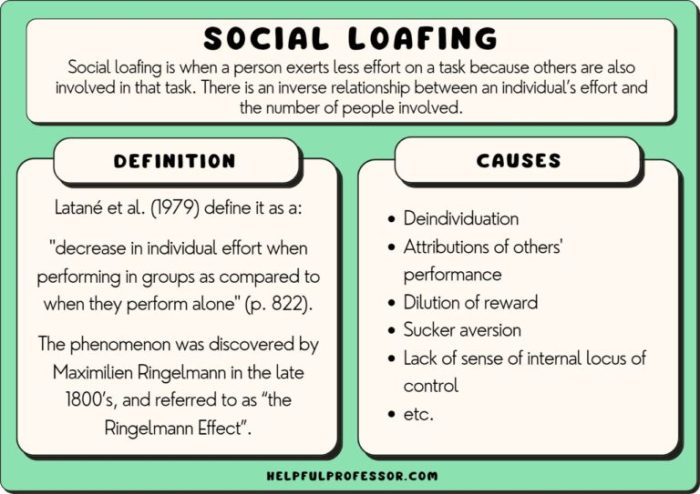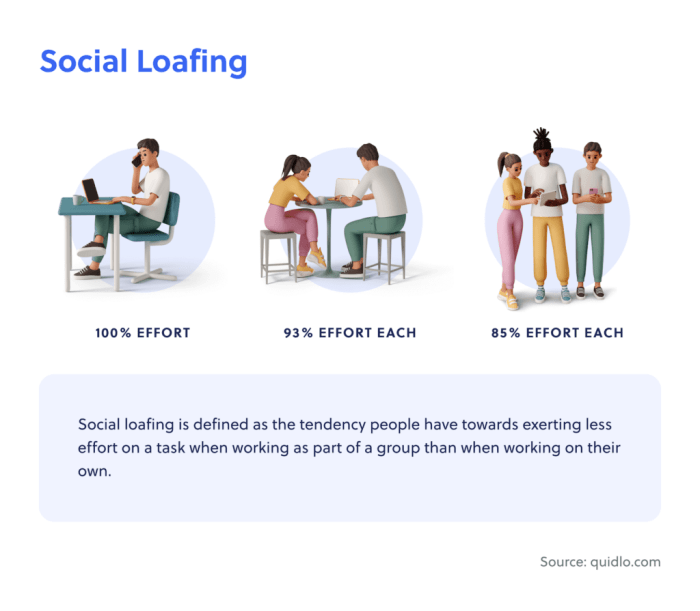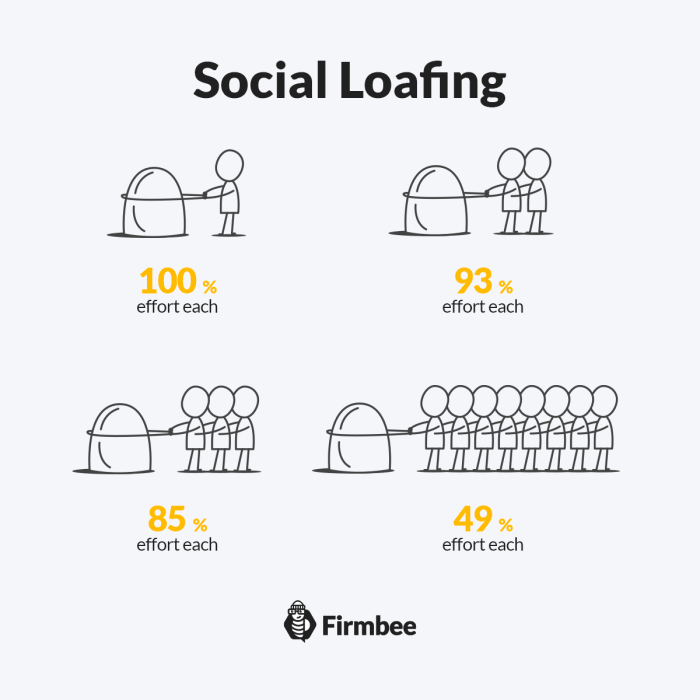Social loafing has been found to be especially noticeable among – Social loafing, a phenomenon where individuals exert less effort when working in groups, has been found to be especially noticeable among certain demographics. This introduction delves into the complexities of social loafing, exploring its manifestations, contributing factors, and implications across various contexts.
Social loafing is a fascinating and multifaceted topic that has garnered significant attention in the field of social psychology. This introduction sets the stage for a comprehensive examination of social loafing, highlighting its prevalence and the diverse influences that shape its occurrence.
Social Loafing in Group Settings

Social loafing refers to the phenomenon where individuals exert less effort when working in a group compared to when working individually. This can occur due to several factors, including reduced accountability, diffusion of responsibility, and decreased motivation.
Social loafing is commonly observed in tasks that are perceived as less important, boring, or repetitive. Examples include group projects, brainstorming sessions, and online collaboration.
Factors Contributing to Social Loafing in Group Settings
- Reduced Accountability:In groups, individuals may feel less responsible for the overall outcome, leading to a decrease in effort.
- Diffusion of Responsibility:When multiple individuals are involved, the responsibility for completing the task becomes diffused, making it less clear who is accountable.
- Decreased Motivation:Working in groups can reduce individual motivation due to a lack of personal recognition or rewards.
Individual Differences and Social Loafing

Individual characteristics and traits can also influence social loafing behavior.
Self-Esteem, Motivation, and Personality Factors
Individuals with low self-esteem or low motivation may be more likely to engage in social loafing. Additionally, certain personality traits, such as extraversion and conscientiousness, have been linked to reduced social loafing.
Strategies for Mitigating Social Loafing by Addressing Individual Differences
- Enhance Self-Esteem:Boosting individuals’ self-esteem can help them feel more confident and accountable for their contributions.
- Increase Motivation:Setting clear goals, providing incentives, and fostering a sense of purpose can increase motivation and reduce social loafing.
- Leverage Personality Traits:Identifying individuals with traits that promote social loafing and assigning them to roles that minimize this effect can be effective.
Cultural Influences on Social Loafing

Cultural norms and values can significantly impact social loafing behavior.
Cultural Expectations
In cultures that emphasize individualism and personal achievement, social loafing may be less common. Conversely, in cultures that value collectivism and group harmony, individuals may be more likely to engage in social loafing to maintain social cohesion.
Strategies for Reducing Social Loafing in Different Cultures
- Understand Cultural Norms:Awareness of cultural norms and expectations can help in designing strategies to reduce social loafing.
- Tailor Interventions:Strategies should be tailored to the specific cultural context, considering factors such as group dynamics and individual motivations.
- Promote Cultural Exchange:Encouraging cultural exchange and dialogue can foster understanding and reduce cultural barriers that contribute to social loafing.
Social Loafing in Online Environments: Social Loafing Has Been Found To Be Especially Noticeable Among

Social loafing can also occur in virtual teams or online collaboration platforms.
Unique Challenges and Opportunities
Online environments present unique challenges, such as reduced social presence and increased anonymity, which can facilitate social loafing. However, they also offer opportunities for enhancing accountability and promoting collaboration.
Strategies for Reducing Social Loafing in Online Environments, Social loafing has been found to be especially noticeable among
- Foster Accountability:Establishing clear roles, assigning individual tasks, and providing feedback can enhance accountability.
- Promote Social Presence:Using video conferencing, online chat, and social media can increase social presence and reduce feelings of anonymity.
- Encourage Collaboration:Utilizing collaborative tools, setting up virtual brainstorming sessions, and promoting peer feedback can foster collaboration and reduce social loafing.
FAQ
What are the key factors that contribute to social loafing?
Social loafing is influenced by various factors, including group size, task anonymity, perceived self-efficacy, and group norms.
How can social loafing be mitigated in group settings?
Strategies to mitigate social loafing include increasing individual accountability, setting clear goals, promoting a sense of belonging, and fostering a positive group climate.
What are the implications of social loafing in online environments?
Social loafing can be particularly pronounced in online environments due to reduced social presence and anonymity. This can hinder collaboration and productivity in virtual teams.